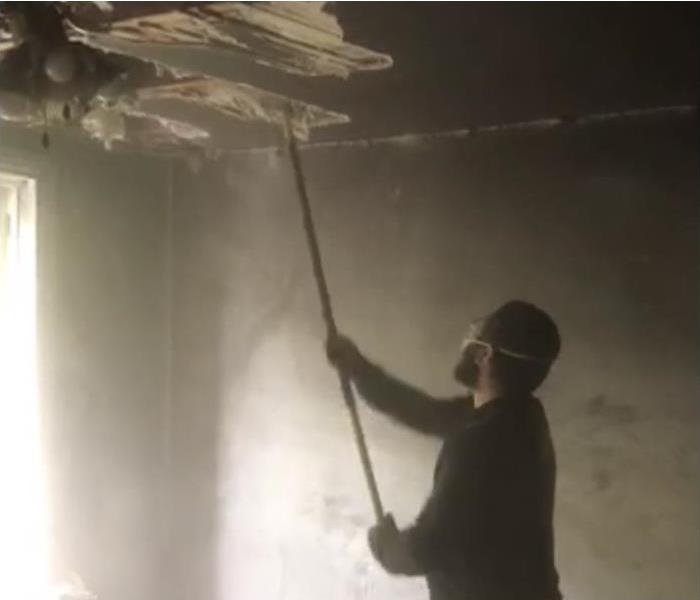Can Fire Damage Affect a Newark Home’s HVAC?
3/30/2023 (Permalink)
 When a fire strikes in your home. Call SERVPRO for fast and immediate fire damage restoration service for your Newark home.
When a fire strikes in your home. Call SERVPRO for fast and immediate fire damage restoration service for your Newark home.
SERVPRO Fire Remediation Includes Duct Cleaning, Repair, and Restoration in Newark
After a home structure fire, Newark residents may be more focused on the immediately visible damages to walls, floors, and contents than on their ventilation systems. However, smoke residues travel through vents and settle inside ducts, where they can spread malodors and affect indoor air quality. This issue is compounded by fire suppression with water, which can eventually create conditions for mold growth and turn soot acidic, which can corrode metals.
SERVPRO fire damage technicians in Newark are equipped to mitigate smoke residues and soil moisture from fire suppression. Remediation services are performed to return the property to a clean, pre-fire condition and include necessary structural repairs.
How Smoke and Soot Damage Impact Ventilation and Indoor Air Quality
Even small-scale home fires can leave smoke residues and other burnt particles in ventilation systems. These contaminants can affect ventilation in the following ways:
- Smoke particles stick to ductwork, which can accumulate dust and other contaminants that impact air quality and odors
- Soot odors and particles can get recirculated throughout the home, spreading odors and residues. This accumulation can also damage air ducts and impact their ability to circulate air effectively
- Soot also collects in air filters and clogs them up quickly, which impacts HVAC performance
- If water extinguished the fire, this moisture could make soot acidic. This acid can corrode metals or etch into ceramics and glass and can also impact indoor air quality
HVAC is especially likely to need thorough cleaning if it was operating when the fire happened. The return air vents, in particular, are likely to have the most contamination. Even passive air movement after a fire can help spread soot and smoke odors throughout the property. In cases of more severe contamination, portions of the ductwork may require sealing during cleanup.
SERVPRO’s Ductwork Cleaning Process Post-Fire Damage
Fire restoration techs at SERVPRO can inspect and clean HVAC systems. Duct cleaning is not typically necessary with lighter damages. In moderate to heavy fire damage situations, ventilation is also often affected. This step is essential to prevent smoke and soot from recirculating in a restored property after completing other cleanup tasks.
HVAC inspection includes the examination of such parts as:
- Filters
- The cooling coil
- Mixing boxes
- Dampers
- Turning vanes
The materials the ducts are made of also matters. Flex duct, for example, is typically more cost-effective to replace than repair due to the number of pleats in the material that can entrap soot. Sheet metal and duct board, meanwhile, are often salvageable. If there is insulation around the vents, this may also necessitate removal as it can carry odors. Its efficacy also diminishes after fire exposure.
SERVPRO professionals can clean vent registers and intakes, and reusable filters. HEPA-filter vacuums remove loose soot and debris from vents. Techs can wash duct surfaces with an EPA-registered detergent solution for more in-depth cleaning. HVAC cleanup includes the restoration of soot-covered mechanical components where needed.
After cleaning, technicians place cheesecloth over ventilation outlets before fogging the ducts. An ultra-low volume (ULV) fogger can deploy duct sealers and deodorizers with the help of the plenum and central blower. After deodorizing, technicians run the central blower until the interior is dry before replacing vent covers and deploying odor counteractant beads to decrease malodors further.
When homeowners need service that makes a disaster seem “Like it never even happened,” they can call SERVPRO of Newark at (302) 733-7933.






 24/7 Emergency Service
24/7 Emergency Service